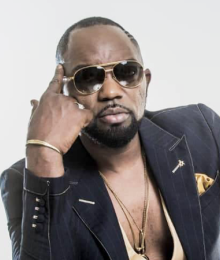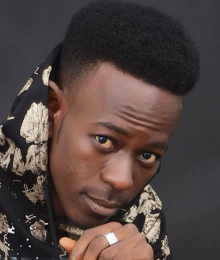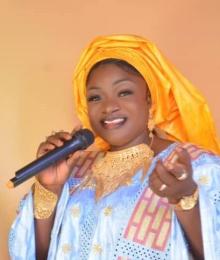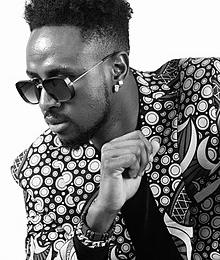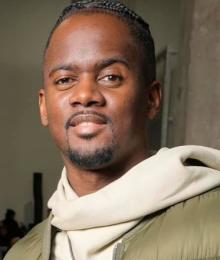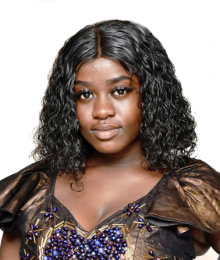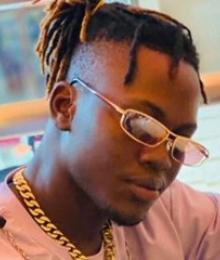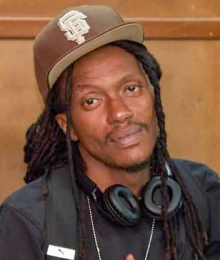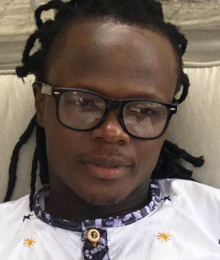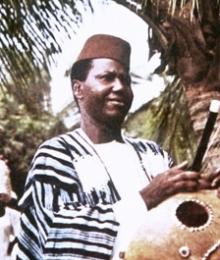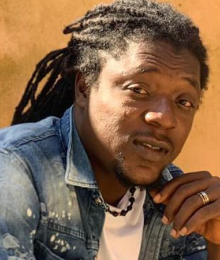
One Time is one of the most popular and committed rappers in Guinea. Born Aboubacar Soumah in 1986 in Fria, he experienced a flashing rise in the world of Guinean hip hop in the early 2000s.
His striking flow and engaged texts showing the difficulties of the youth of popular neighborhoods earned him great popularity among the young Guinean youth.
Behind its smoked glasses and streetwear style, One Time hides an atypical course, made of persistence and resilience.
From school benches to the stages of the biggest festivals, he has been able to impose his style and become an indispensable figure in the Guinea rap scene. Portrait of an unusual rapper.
One Time is one of the most popular and committed rappers in Guinea. Born in Fria in 1986, he has established himself in a decade as one of the indispensable figures of the Guinea rap scene.
His crude texts denouncing police violence, elite corruption and social injustice have met a special echo among Guinean youth. His striking style, mixing rap, dancehall and traditional African music, contributed greatly to his success.
Despite a successful career with three solo albums, One Time remained faithful to its popular neighborhood roots. His atypical journey, from his modest beginnings in Fria to his concerts in front of thousands of fans, forces respect.
One Time has become one of the indispensable voices of Guinean and African youth. His commitment to the education and insertion of young people inspires a whole generation.
Enfance et éducation
Born in Fria, an important port city in northwestern Guinea, One Time grew up in a modest environment. From an early age, he was fascinated by American hip hop, which he discovered on radio and television. At primary school, he was already distinguished for his sense of rhythm and creativity.
Despite the difficult educational conditions, he continued his studies at Donka College and High School, one of the finest institutions in the capital Conakry.
At the same time, he began writing his first lyrics and practicing rap. His passion for music prompted him to temporarily interrupt his studies before achieving his bachelor's degree at Kipé High School in 2007.
Determined to pursue front studies and music, One Time then went to study at the University of N'Zérékoré where he obtained a bachelor's degree in natural resource management. This scientific formation breaks with the rebellious image of the rapper but testifies to his intellectual curiosity.
Débuts musicaux
It was under the name "Dancehall Warrior" that One Time made its first steps in Guinean rap in the early 2000s. His first titles such as "La Banlieue Brûle" struggled to find their audience.
It was by joining the Pan-African group 2HR and participating in their album "Hip Hop Never Die" that his career took off. Alongside artists such as Gaspi, Kamikaz or Alaza, he refined his style and gained first visibility on the Guinea scene.
In 2011, after this first experience, he decided to go solo under the name of One Time. With the concept "Pouwè" (power in Subsu language), he affirms a dedicated music that testifies to the difficult daily life of suburban youth. His raw and uncompromising texts quickly became popular.
Succès et engagement
The real success came in 2015 with the release of her first solo album "Pouwè". Carried by titles such as "Telephone" or "S adversarial", the album encounters a very favourable echo, among the young Guineans who recognize themselves in the lyrics of One Time.
Its striking style combining rap, dancehall and traditional African music seduces by its originality. His limited-budget but careful-visual clips are also part of his growing popularity.
Beyond the success, One Time quickly became one of the most engaged voices in Guinean hip hop. In his texts, he denounces police violence, elite corruption and social injustice.
His indignation at living conditions in popular neighborhoods is echoed after the 2020 protests.
His involvement with the authorities sometimes made him uncomfortable, but his popularity with young people remained untouched. Many young Guineans recognize his atypical journey and his denunciation of the evils of Guinean society.
Consécration
With three solo albums in stock in 2022, One Time is now a sure value of rap engaged in West Africa. Award-winning at numerous festivals, he performed on the stages of FESPAM (Pan African Music Festival) or FEMUA (Anoumabo Urban Music Festival).
His featuring with other African rap stars such as Didier Awadi, Kiff No Beat and Gaz Maotoo also contributed to his growing popularity.
In parallel with his musical career, One Time became an ambassador for the television channel Afroculture TV. There he produced several programmes devoted to African culture and the development of young talents of the continent.
Despite the success, One Time remains faithful to its roots and popular neighborhoods that have seen it grow. Through his foundation, he is committed to the education and professional integration of youth from the suburbs. His atypical journey inspires many young Guineans.
Conclusion
Incarnation of rap engaged in Francophone Africa, One Time has established itself in a decade as one of the indispensable figures of the Guinean musical scene.
Behind the rebellious image, he managed to preserve an artistic demand and an unwavering commitment to denouncing the evils of Guinean society.
His career inspires respect, from his modest beginnings in Fria to his concerts in front of thousands of fans. One Time found the words and flow to give a voice to the youth of Guinea and Africa.
At the age of 36, the one who dreamed of being a teenager in front of MTV now has an influence that extends far beyond the borders of his country.











